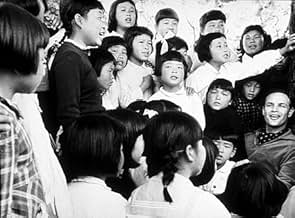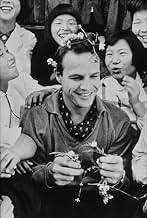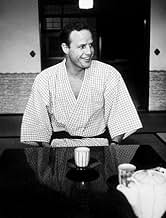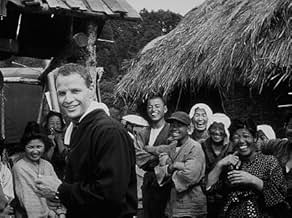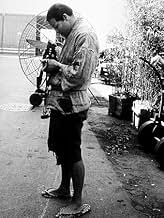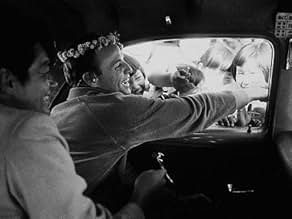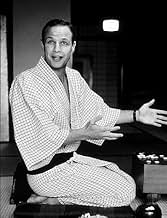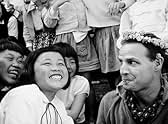IMDb RATING
6.6/10
3.9K
YOUR RATING
In post-WWII Japan, an American captain is brought in to help build a school, but the locals want a teahouse instead.In post-WWII Japan, an American captain is brought in to help build a school, but the locals want a teahouse instead.In post-WWII Japan, an American captain is brought in to help build a school, but the locals want a teahouse instead.
- Awards
- 1 win & 9 nominations total
Machiko Kyô
- Lotus Blossom
- (as Machiko Kyo)
Harry Morgan
- Sgt. Gregovich
- (as Henry {Harry} Morgan)
Carlo Fiore
- Soldier
- (uncredited)
John Grayson
- Soldier
- (uncredited)
Harry Harvey Jr.
- Soldier
- (uncredited)
Miyoshi Jingu
- Old Woman on Jeep
- (uncredited)
Roger McGee
- Soldier
- (uncredited)
Dansho Miyazaki
- Sumata's Father
- (uncredited)
Minoru Nishida
- Mr. Sumata
- (uncredited)
Aya Oyama
- Daughter on Jeep
- (uncredited)
Featured reviews
If you're not a fan of Glenn Ford's westerns, and you think he's merely an ordinary everyman, check out his timed perfection in The Teahouse of the August Moon. With such great talent, it's a wonder Jack Lemmon rose to stardom so quickly. Glenn has all the hesitation, stammering, exasperation, and desire to fix that it takes to be a comic genius. If the first time around, you don't catch all his jokes, don't worry. You were just laughing so hard, you couldn't keep up with the fast pace.
Every time I watch this delightful gem, I laugh myself sick. It does have a long running time, but it certainly goes by quickly. Glenn Ford's character is stationed in Okinawa after WWII, to oversee reconstruction and the wellbeing of the Japanese people. But in his mission to spread democracy, he's completely clueless in his new environment. Marlon Brando plays the scene-stealing Sakini, a Japanese interpreter who winks at and nudges the audience when he wants to make an inside joke. But even with an interpreter, Glenn still finds himself getting into one misunderstanding after another.
While it's seen as "white washing" by today's standards, Marlon Brando didn't intend for his performance to be offensive. In fact, he lived in a nearby Japanese village for four months to absorb the mannerisms, accent, and mentality of the local people. I found his portrayal of the savvy interpreter to be flawless; not only that, but I couldn't find any trace of his usual expressions or gestures. He completely transformed himself.
The story is heartwarming, funny, smart, and bittersweet. From Eddie Albert's obsession with soil and worms to Machiko Kyo's touching tea ceremony, this 1956 comedy is a one-of-a-kind gem with countless delightful moments.
Every time I watch this delightful gem, I laugh myself sick. It does have a long running time, but it certainly goes by quickly. Glenn Ford's character is stationed in Okinawa after WWII, to oversee reconstruction and the wellbeing of the Japanese people. But in his mission to spread democracy, he's completely clueless in his new environment. Marlon Brando plays the scene-stealing Sakini, a Japanese interpreter who winks at and nudges the audience when he wants to make an inside joke. But even with an interpreter, Glenn still finds himself getting into one misunderstanding after another.
While it's seen as "white washing" by today's standards, Marlon Brando didn't intend for his performance to be offensive. In fact, he lived in a nearby Japanese village for four months to absorb the mannerisms, accent, and mentality of the local people. I found his portrayal of the savvy interpreter to be flawless; not only that, but I couldn't find any trace of his usual expressions or gestures. He completely transformed himself.
The story is heartwarming, funny, smart, and bittersweet. From Eddie Albert's obsession with soil and worms to Machiko Kyo's touching tea ceremony, this 1956 comedy is a one-of-a-kind gem with countless delightful moments.
This film made me realize how much we've lost as a country since the 1950s. According to Wikipedia at least, the book, play, and film were enormously popular for about 25 years, when political correctness set in, and liberals were oh-so-terribly aghast at Marlon Brando playing an Okinawan with a heavy accent. But it's Brando's character who is the most admirable in the movie -- sharp, perceptive, and cunning, but also warm, generous, and forgiving.
All told, it's the Okinawans who come off well -- it is we Americans who seem rather ridiculous, with our notions of winning hearts and minds and spreading democracy. Remember that this film was made just ten years after WWII, when we were up against the Soviet Union, and democracy and "the American way" were at the heart of what we thought we were all about. But here is a film that completely satirizes, if not ridicules, all that, and yet it was enormously popular.
Perhaps I'm looking at it through rose-tinted lenses -- there may well have been the Michael Savages and Rush Limbaughs of the day who inveighed against the Hollywood liberals seeking to undermine American resolve in the face of the Soviet threat and disgracing the memory of those who had died in WWII.
But I think, more accurately, it was a time of greater American self- confidence, when we were able to laugh at ourselves more easily, and weren't terrified that this, that or another group might be ticked off.
In short, this is a wise movie that should be seen by all those in power who have anything to do with how we conduct ourselves toward other nations and peoples -- as well as anyone who wants to see an entertaining but also educational film.
All told, it's the Okinawans who come off well -- it is we Americans who seem rather ridiculous, with our notions of winning hearts and minds and spreading democracy. Remember that this film was made just ten years after WWII, when we were up against the Soviet Union, and democracy and "the American way" were at the heart of what we thought we were all about. But here is a film that completely satirizes, if not ridicules, all that, and yet it was enormously popular.
Perhaps I'm looking at it through rose-tinted lenses -- there may well have been the Michael Savages and Rush Limbaughs of the day who inveighed against the Hollywood liberals seeking to undermine American resolve in the face of the Soviet threat and disgracing the memory of those who had died in WWII.
But I think, more accurately, it was a time of greater American self- confidence, when we were able to laugh at ourselves more easily, and weren't terrified that this, that or another group might be ticked off.
In short, this is a wise movie that should be seen by all those in power who have anything to do with how we conduct ourselves toward other nations and peoples -- as well as anyone who wants to see an entertaining but also educational film.
This movie was the first chance to see Marlon Brando in a truly comical role, not the "He Man"-unbelievably good! His accent, his body movements, the Japanese he spoke, hard to believe this was the same man who did the Waterfront.I really think he deserved an award for this role. These were a couple of the most enjoyable hours I've ever spent. Having lived in Okinawa, and familiar with the practical, down-to-earth people there, I enjoyed the movie that makes so much fun and caricatures narrow-mindedness and pompousness while exalting creativity, adaptation, and "what really matters". The movie does make fun of the narrow-mindedness of some Americans, and shows the Okinawans with respect and tenderness, as assertive, business-minded, resilient, and proud. A real quality movie, and I'm so glad I taped it from Turner Classic movies.10 out of 10.
Marlon Brando stars as a Japanese interpreter and Glenn Ford plays a captain who has been in almost every branch in the military. Ford is ordered to go to a Japanese village to teach the people about democracy and to build a schoolhouse in the shape of the pentagon. The Japanese are only interested in building a teahouse and their isn't enough money to build both. The Japanese try to sell some homemade stuff but it won't sell until Ford finds out that they also make brandy. The military can't get enough brandy, so they build a teahouse instead of a schoolhouse. The military don't like what Ford is doing so they send a psychiatrist but he ends up helping them out instead. I thought Glenn Ford was great here and Brando also did a good job.
I have spent many years on Okinawa and am always amazed at Brando's ability to create a character (Sakini) that is true to the Okinawan character. I have watched it many times over and enjoy it every time. When I'm asked why I visit Okinawa so often, I usually loan them my copy of "Teahouse" and wait for a response. It is a story of a resilient and happy people who have retained their culture, through many invasions. Brando's monologue at the beginning and end of the film masterfully explains it all. The kids will like it and adults should get a laugh while watching the arrogant victors being steered to the Okinawan's needs in a hilarious manner. It's not quite history and it's not quite fantasy, but it's all good fun.
Did you know
- TriviaProduction began with Louis Calhern playing Col. Purdy, but Calhern died after more than a month of filming. Paul Ford was quickly recruited, as he had created the role on Broadway, and this resulted a revived career for the lovable, irascible character actor.
- GoofsWhile Fisby and Sakini are finishing up their first address to the villagers Sakini asks Fisby what time it is. He responds that it's a quarter to 5:00. But the sun is directly over their heads as if it were noon.
- ConnectionsFeatured in Okinawa: Keystone of the Pacific (1973)
- SoundtracksSakura Sakura (Cherry Blossoms)
(uncredited)
Written and Arranged by Kikuko Kanai
Sung by Lotus Blossom
Details
- Release date
- Country of origin
- Languages
- Also known as
- The Teahouse of the August Moon
- Filming locations
- Production company
- See more company credits at IMDbPro
Box office
- Budget
- $3,926,000 (estimated)
- Runtime2 hours 3 minutes
- Sound mix
Contribute to this page
Suggest an edit or add missing content

Top Gap
By what name was La petite maison de thé (1956) officially released in India in English?
Answer

